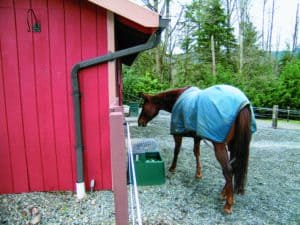Never-Ending Vet Costs
- Topics: Smart Horse Keeping
OK. Now let’s get into the real hands-on cost-saving. Last week’s introduction hopefully got your mind thinking (or stressing) about reducing your equine expenses. This week we’re focusing on veterinary costs. Unfortunately, this is an area where you can LEAST afford to cut back and still have the best interest of the horse at heart.
In talking to farm owners and veterinarians, I’ve discovered one of the most beneficial cost-saving steps you can take with your horse’s health is to educate yourself and do your research. I did mine for this chapter and here are a few things that kept popping up:
-
Vaccinations and dewormers vary. There’s no set list of necessary vaccinations or a de-worming regimen that’s going to apply to every horse. How many horses do you own, how often do they leave the farm, how old is your horse, where do you live, what season is it, what is each horse’s purpose É what a headache. The American Association of Equine Practitioners has a great resource for recommended vs. risk-based vaccinations on its Web site.
-
Fecal testing to save money on deworming. These low-cost tests give a parasite egg count and can be used to identify what horses need treatment for which parasites and how often. Some veterinarians encourage it to reduce dewormer resistance and determine where you can safely cut back on deworming, while others caution against its reliability. Your thoughts?
-
Form a cooperative with similar horse owners. This can save you money in tons of ways, but particularly in respect to purchasing dewormers and organizing vaccinations and veterinary visits.
-
Get to know your vet. Ultimately, when it comes to your horse’s health the most important resource you can have is your own vet.
Below is an excerpt from this month’s chapter on Equine Health Care that provides some vaccination advice and emphasizes how your relationship with your vet can affect your wallet. The complete chapter will include more cost-effective deworming and veterinary information and will be available for download at the end of the month. Remember to comment and share ways you’ve saved on veterinary care for our final reader suggestion chapter of the book TheHorse.com is home to thousands of free articles about horse health care. In order to access some of our exclusive free content, you must be signed into TheHorse.com. Already have an account?Create a free account with TheHorse.com to view this content.
Start your free account today!
and continue reading.

Written by:
Alexandra Beckstett
Related Articles
Stay on top of the most recent Horse Health news with














